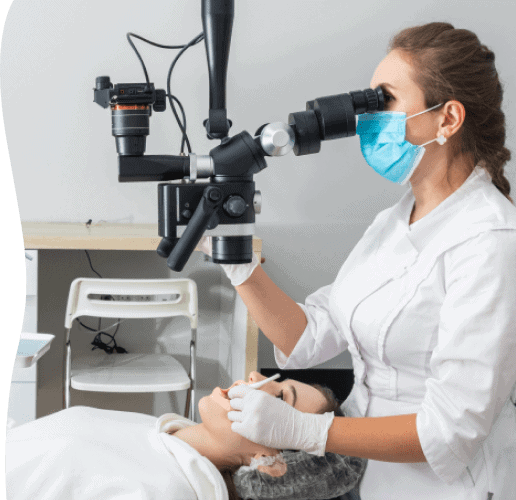Learn More About Bad Breath
Bad breath is one of the common oral health issues that we face every day. It cannot be comfortable to experience it. But don’t worry, several managements are available. At The Smile Space, we may help to improve your dental hygiene and get to the root of the problem.


Fight Back Bad Breath and Get a Fresher Smile.
Everyone could experience bad breath from eating foods with strong odours, such as garlic and onions. However, if persistent, it could indicate an oral health issue like gum disease, dry mouth, or tooth decay. Many products can help reduce bad breath, but a dentist can find the root cause of the problem. And we can provide dental management depending on what is causing the bad breath.
If you’re experiencing halitosis that doesn’t go away, it’s time to visit The Smile Space for a check-up. Our team of dental professionals will thoroughly assess your dental health to tailor a plan for you to fight back against the problem.
We use different dental procedures to address conditions that trigger breath smells. Whether you need a scale and clean, gum disease treatment, or tooth fillings, the dentists in our clinic are dedicated to delivering healthy results through these services. Our dental clinic is here to help you prevent bad breath in Sutherland. With the use of our advanced techniques, your smile can smell fresher again.
Dental Services that Can Address Bad Breath
Scale and Clean
Sometimes, brushing your teeth at home may not be enough to keep your mouth smelling fresh. With a scale and clean, we can eliminate dental plaque accumulation and tartar between teeth and gum tissue and leave your mouth not only feeling, but also smelling, brand new.
At The Smile Space, we carefully perform the procedure with the use of specialised instruments to loosen unwanted debris, which can be the potential source of bad breath.


Gum Disease Treatment
Gum disease begins with bacteria from tartar or plaque buildup. This condition may result in halitosis. Fortunately, the dentist can diagnose and provide treatments to manage bad breath.
We may recommend deep cleaning the teeth with scaling and root planing, prescribing antiseptic mouthwash, or other techniques to reduce foul smells and bacteria. You can visit our dental clinic to see if this approach is what you need.
Tooth Extractions
An unpleasant smell from the mouth could be caused by severe tooth decay, deep cavities or periodontal disease. At The Smile Space, we want to preserve natural teeth as much as possible.
But in some cases, our dental team may recommend tooth extraction to remove the affected tooth and protect your oral health completely. It is only necessary in cases where other dental treatments are unable to manage bacteria and infection.


Dental Fillings
When your tooth gets cracks, cavities, or chips, food particles and bacteria can get trapped and increase the risk of tooth decay. Dental fillings can be another method of addressing this problem. The dentist will apply a tooth-coloured material in the area to protect the tooth.
If you notice that your breath isn’t as fresh as it could be, schedule an appointment with the dentist in our dental clinic and let us take care of your smile.
Get Outstanding Dental Care with Us Today
At The Smile Space, we believe that comprehensive dental care should be accessible to everyone. Our experienced team is dedicated to providing the highest standard of care, using the latest technology and techniques. If you're looking for a dentist in Sutherland, book an appointment at The Smile Space today!

Frequently Asked Questions
About Bad Breath
How will I know If I have bad breath?
The common symptom of halitosis is an unpleasant odour coming from the mouth. The famous technique to determine whether your breath smells bad is the ‘breathe-in-your-hand-and-smell-it’ method. However, this trick may not always be accurate.
A better way to manually assess your breath is to ask someone you trust to smell your breath or lick your wrist and smell it. The scent of breath on the skin can be easier for your nose to pick up. The dentist can use other methods to see if you have bad breath. These may include the straw test, halimeter test, and taste test.
Do certain foods cause bad breath?
When you digest strong-smelling foods, the breakdown of their particles can contribute to increased bacteria and foul odour in your mouth. After digestion, they enter your bloodstream and are carried to your lungs, where they affect your breath.
Some of these foods include onions, garlic, spices, and beverages like coffee and alcohol. Also, limit your intake of sugary foods and drinks, as they can contribute to bacterial growth in your mouth.
How do I prevent bad breath at home?
You may prevent bad breath at home by practising good oral hygiene. It means you should brush your teeth twice daily, floss between them, and clean your tongue with a toothbrush or tongue scraper. You can also use an antibacterial mouthwash to help eliminate debris and bad breath smells.
Finally, to keep your mouth moist and help stimulate the production of saliva, we highly suggest drinking plenty of water and chewing sugarless gum. These good habits can help to keep your teeth and gums healthy and away from dental problems that can trigger halitosis.
Will bad breath go away on its own?
The answer depends on the root cause of your unpleasant breath. If the reason is poor oral hygiene, it may temporarily go away using mouthwash and toothpaste. But persistent bad breath smells may not subside until you see a dental professional. In most cases, the underlying conditions must be addressed for bad breath to disappear.


